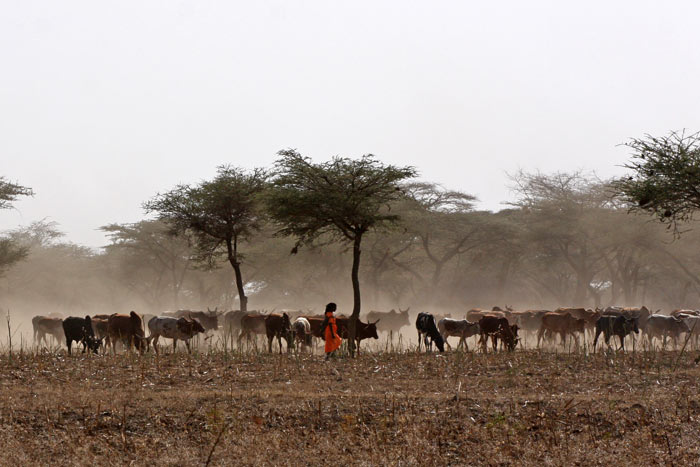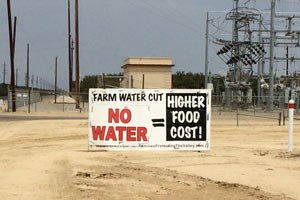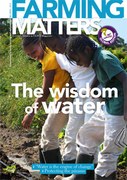To many analysts, global water governance is about getting the institutions right: more accountable water users and more public participation in decisions. But are we barking up the right tree? In this analysis, we argue that when analysing global water governance, one needs to look at the global players that really matter – an exclusive group of global food traders. These traders must be held accountable for their water footprint.

Farmers’ stewardship of water and soils is disregarded
Agriculture is the main water user in the world. 70 % of water is withdrawn by the agricultural sector, 20 % by the non-farming industry and 10 % by domestic users.
These figures hint at the hidden water that is traded when food and commodities are bought and sold. Thus, global corporations that trade the world’s food and heavily influence agricultural markets also influence how water is used.
Global agricultural trade
Ten years ago, global agricultural trade was exclusively dominated by five Western agribusiness conglomerates: ADM (Archer Daniels Midland), Bunge, Cargill, Louis Dreyfus and Glencore, together accounting for about 80 % of all staple commodities. These companies are free trade advocates, yet they are among the biggest recipients of public agricultural subsidies in industrialised countries. Cargill can hoard so much grain that it can single-handedly create scarcity or manipulate the price – up in times of scarcity, and down in abundant times. This has severe consequences for farmers as it can make farming uneconomic in particular regions.
These players have prime state of the art information systems and excellent relations with political and economic movers and shakers on the global scene. They dominate food marketing and even dabble in the banking business, offering ‘risk management solutions’. In other words, these corporations control the world’s agricultural markets. Through that, they also manage and control a large part of the world’s water resources, as we will explain.
After the food price spikes of 2007/8, and food riots in some 30 countries, public and private actors faced with food scarcity started to look for direct investment opportunities, e.g. through state companies and stateowned investment funds. In particular, the Chinese owned investment fund, CofCo, purchased the food unit of Noble Group, a large trader of bulk commodities, in 2014. The goal was to counter Western control over food trade by establishing a trader similar to Cargill, but based in China.
Hidden water

The ‘virtual water content’ of a product is the volume of freshwater used to produce that product at the place where it was actually produced. The volumes of ‘virtual water’ traded around the world are large but remain hidden. In particular, South America, the water tower of the world in terms of availability per person, is of fundamental importance for the production of food that is shipped to other less water-endowed regions.
Global traders are not forthcoming about their water use. They account for all inputs such as fertilizers, pesticides, labour and energy. The only resource missing is water. And their dominant role in ‘virtual water’ trade and therefore global water governance must be made clear.
Gross international virtual water flows from 1996 to 2005. Those greater than 15 km3 are illustrated with arrows. Source: Hoekstra and Mekonnen
Traders influence water resource management through market power and active sourcing decisions. The relationship between traders and farmers can influence whether management will be sustainable. For example, if traders support their suppliers to grow food using sustainable water management options, the world’s water resources could be under less pressure.
Mismanagement
Although 30 % of the world’s aquifers are heavily depleted, this increasingly scarce water is still used for unsustainable irrigation projects and often traded in commodities. Water is not managed wisely because it is not officially counted as an input factor. Irrigation leading to higher yields, often subsidised to keep prices low, is the preferred option to keep the global food trade system going. Even though about 40 % of food is wasted globally due to inefficiencies in the food system, the powerful minority are intent on maintaining the status quo. And in the process, farmers and their sustainable stewardship of water and soils are disregarded. Instead of addressing sustainable water and soil management another round of externalising environmental costs is taking place.
Land grabbing

Next to unsustainable and wasteful use of water, the control over water by Western and increasingly Asian traders has led to a scramble for land with water. The land and water grabbing we witness today works like a new enclosure movement, effectively undermining farmers’ traditional rights to water and land.
Globally, millions of hectares have been leased by investors ‘betting on a quick buck’ at the expense of local populations. In Africa and Asia, land rights are often not codified, or contradictory, so that investors can easily treat these plots as ‘unoccupied’ and ‘underutilised’.
For pastoralists, enclosed lands impede traditional grazing patterns and access to vital natural resources. Governments collude and facilitate land grabbing to make money. And these are not small plots: the ProSAVANA land development project in Mozambique, a cooperation between Mozambique, Brazil and Japan in the name of increasing agricultural production, covers an area equal to Austria and Switzerland combined.
Ethiopia is likewise carved up among domestic and even foreign investors. Europe is not exempt. Land and water grabbing is notably visible in the fertile lands of Romania and Bulgaria. These are only a few telling examples. This is a dangerous situation for the quantity and quality of water resources and a threat to family farmers whose lives and livelihoods depend on sustainable access to clean and affordable water.
More accountability
Accountability of the few is not an option but an imperative
While trade is global, water management takes place at the local level. This raises important questions about power asymmetries because money and power is accumulated in the hands of a few global traders who largely ignore the needs of the many farmers that manage and use the water.
Accountability of the few for their role in water governance, management and use is thus not an option but an imperative to avoid an all-out water crisis. This is our key message for actors working to improve global water governance.
Obligatory accounting for water use would force corporations to disclose their water footprint via their balance sheets to allow investors and the interested public to compare and contrast performance. In that way, global agricultural traders would not only disclose their water footprint but their full power in global trade would be made public.
Jeroen Warner, Martin Keulertz and Suvi Sojamo
Jeroen Warner is an associate professor of Disaster Studies at Wageningen University.
Email: jeroenwarner@gmail.com
Martin Keulertz is a research associate at Texas A&M Water-Energy-Food Nexus Group.
Email: martin.keulertz@gmail.com
Suvi Sojamo is a PhD researcher at the Water and Development Research Group, Aalto University, Finland.
Email: suvi.sojamo@aalto.fi
Together with J Anthony Allan, they edited the Handbook of Land and Water Grabs in Africa.

